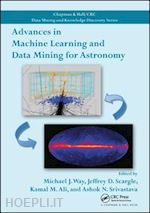Part I: Foundational IssuesClassification in Astronomy: Past and Present, Eric FeigelsonSearching the Heavens: Astronomy, Computation, Statistics, Data Mining, and Philosophy, Clark GlymourProbability and Statistics in Astronomical Machine Learning and Data Mining, Jeffrey D. Scargle Part II: Astronomical ApplicationsSource IdentificationAutomated Science Processing for the Fermi Large Area Telescope, James Chiang CMB Data Analysis, Paniez Paykari and Jean-Luc StarckData Mining and Machine Learning in Time-Domain Discovery and Classification, Joshua S. Bloom and Joseph W. RichardsCross-Identification of Sources: Theory and Practice, Tamás BudaváriThe Sky Pixelization for CMB Mapping, O.V. Verkhodanov and A.G. DoroshkevichFuture Sky Surveys: New Discovery Frontiers, J. Anthony Tyson and Kirk D. BornePoisson Noise Removal in Spherical Multichannel Images: Application to Fermi Data, Jérémy Schmitt, Jean-Luc Starck, Jalal Fadili, and Seth Digel ClassificationGalaxy Zoo: Morphological Classification and Citizen Science, Lucy Fortson, Karen Masters, Robert Nichol, Kirk D. Borne, Edd Edmondson, Chris Lintoot, Jordan Raddick, Kevin Schawinski, and John WallinThe Utilization of Classifications in High-Energy Astrophysics Experiments, Bill AtwoodDatabase-Driven Analyses of Astronomical Spectra, Jan CamiWeak Gravitational Lensing, Sandrine Pires, Jean-Luc Starck, Adrienne Leonard, and Alexandre RéfrégierPhotometric Redshifts: 50 Years after 345, Tamás BudaváriGalaxy Clusters, Christopher J. Miller Signal Processing (Time-Series) AnalysisPlanet Detection: The Kepler Mission, Jon M. Jenkins, Jeffrey C. Smith, Peter Tenenbaum, Joseph D. Twicken, and Jeffrey Van Cleve Classification of Variable Objects in Massive Sky Monitoring Surveys, Przemek Wozniak, Lukasz Wyrzykowski, and Vasily BelokurovGravitational Wave Astronomy, Lee Samuel Finn The Largest Data SetsVirtual Observatory and Distributed Data Mining, Kirk D. BorneMultitree Algorithms for Large-Scale Astrostatistics, William B. March, Arkadas Ozakin, Dongryeol Lee, Ryan Riegel, and Alexander G. Gray PART III: Machine Learning MethodsTime–Frequency Learning Machines for Nonstationarity Detection Using Surrogates, Pierre Borgnat, Patrick Flandrin, Cédric Richard, André Ferrari, Hassan Amoud, and Paul HoneineClassification, Nikunj OzaOn the Shoulders of Gauss, Bessel, and Poisson: Links, Chunks, Spheres, and Conditional Models, William D. HeavlinData Clustering, Kiri L. WagstaffEnsemble Methods: A Review, Matteo Re and Giorgio ValentiniParallel and Distributed Data Mining for Astronomy Applications, Kamalika Das and Kanishka Bhaduri Pattern Recognition in Time Series, Jessica Lin, Sheri Williamson, Kirk D. Borne, and David De BarrRandomized Algorithms for Matrices and Data, Michael W. Mahoney Index












